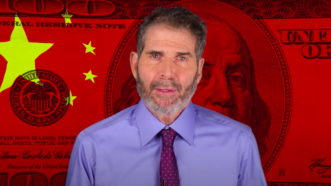Civil Liberties
Teacher Spying Is Instilling Surveillance Culture Into Students
“We totally stalked what they were doing on Google,” one teacher said.
Court Bars Mother from Exposing "Child to an Activity That Violates" "Child's Orthodox Jewish Chasidic Faith";
N.Y. appellate court reverses the order.
From Halftime Show to Social Media, Calls To Ban Rap
Plus: Texas voting law likely unconstitutional, remote workers and rural towns, and more...
Canada's Freedom Convoy Embodies Fatigue with Pandemic Authoritarianism
COVID-19 policies eroded liberty and many people want it back.
SSRN Removes Academic Paper Due to Defamation Claim
A paper by Professor Ann Lipton has been deplatformed because Philip R. Shawe does not like how it portrays his actions in a business dispute, and now a law review may refuse to publish the piece.
Assessing the State of the Struggle to Reform Qualified Immunity
The Institute for Justice offers a generally pessimistic appraisal of the situation under state law, but some optimism about prospects in the Supreme Court.
NYC Mayor Adams Wants More Facial Recognition Software for Cops
Facial recognition software can secretly surveil and is subject to error.
New Report Highlights an Old Problem—the CIA Is Still Snooping on Americans
In a program separate from the ones disclosed by Edward Snowden, we see more mass secret domestic data collection.
Homeland Security Is Already Mobilizing Against Potential Protests by U.S. Truckers
Plus: The EARN It Act advances, against climate despair, and more...
The Heritage Foundation Wants To Break the Internet
The conservative think tank identifies some genuine concerns about tech companies, but gets the prescription wrong.
OK for Judge to Appear in Ad Saying He "Got Into Law in Part to Advocate for Marginalized Communities"
The ad was an ad for a college that he had attended.
Chris Stewart Wants February To Be 'Uncomfortable History Month'
Nearly 90 gag-order bills would ban schools from teaching the grisly particulars of American history. This activist is fighting against the censorship and for school choice.
Appeals Court Rules Ohio Cops Didn't Have Cause To Arrest Man Wearing 'Fuck the Police' Shirt
The sheriff's deputies are also not entitled to qualified immunity because the First Amendment right to offend police has been repeatedly upheld.
China Brings Out the Hypocrisy in Corporate Social Justice Warriors
"I think the Chinese government actually takes a lot of pleasure knowing that they can actually strong-arm individuals and companies into capitulation to its own political ideology."
Partisan Politics Cloud the Capitol Riot's Significance
Neither Republicans nor Democrats can be trusted to give an honest account of what happened that day.
George Washington University Backpedals After Agreeing To Investigate Critics of China
"Upon full understanding, I do not view these posters as racist; they are political statements," said university president Mark Wrighton.
Artist Ai Weiwei Warns of Chinese and American Authoritarianism
In 1000 Years of Joys and Sorrows, the renowned artist details his struggles with censorship.
Dear Olympics Media: Please Spare Us Your Fawning Over China's Digital Surveillance
Regarding the authoritarian country's central bank digital currency, you do not, under any circumstances, “gotta hand it to them.”
With "Friends" Like These ….
“After accepting a ‘friend’ request from the officer, the defendant published a video recording to his social media account that featured an individual seen from the chest down holding what appeared to be a firearm. The undercover officer made his own recording of the posting, which later was used in criminal proceedings against the defendant.” No Fourth Amendment violation, says Massachusetts high court.
Joe Rogan, Canadian Truckers, Coronavirus Mandates, and the Terrible State of Free Speech
What Joe Rogan and Canadian truckers tell us about free speech.
Always Glad to Get Pro Bono Court-Appointed Amicus Work
This may be especially helpful in cases involving sealing or pseudonymity, where the parties agree with each other but the public interest ought to be represented.
GoFundMe Rejects Fundraising for Canadian Freedom Convoy
Plus: Is Web3 a scam? Does the Joe Rogan/Spotify controversy have anything to do with Section 230? And more...
Biden's False Gun Claims Are a Lousy Basis for Law
Already abused for political purposes, the power of government shouldn’t be expanded based on lies.
Lawyer L. Lin Wood Enjoined from Violating Non-Disparagement Agreement
Enforcing that agreement isn’t an unconstitutional prior restraint, holds the Georgia Court of Appeals.
Amir Locke's Death Should Incense Anyone Who Cares About Gun Rights
The 22-year-old man was shot by a Minneapolis police officer during the execution of a no-knock warrant on which he was not named.
Court Rejects Pacira Biosciences' Trade Libel Claim Over Article in Leading Medical Journal About EXPAREL
"The peer-review process—not a courtroom—... provides the best mechanism for resolving scientific uncertainties."
A California Sheriff Remains Free To Rob Armored Cars Carrying Money From State-Licensed Marijuana Businesses
A federal judge declined to issue a temporary restraining order, saying the evidence of legal violations is insufficient at this point.
Should a Christian Group Be Allowed To Fly a Flag Outside Boston City Hall?
The Supreme Court will soon decide a case that tests the limits of expression on government property and religious toleration.
Palin Faces 'Uphill Battle' in Proving the Times Defamed Her
Plus: Mask mandates and omicron cases, purging "pornography" drives calls for book bans, and more...
D.C. Cops Conspired to Keep Records From Reporters, Activists, and Critics, Says Lawsuit
Defense lawyer Amy Phillips is suing over what she calls the department's "watchlist policy."
Americans Want Police Reform, Not Abolition. So Did This Slain NYPD Officer.
Despite a binary media narrative, the vast majority of the U.S. is in favor of quality, accountable policing.
Judge: Criticisms of Epoch Times Were Substantially True or Opinion, Not Libel
“Like it or not, news analysis is often delivered with plenty of English on the ball in service of an ideological agenda and market viability. Whether such practices contribute positively to delivering our species closer to the truth is a question for philosophers. It is not enough to support a defamation claim.”
U.K. Officials Want Even More Power To Punish You for Being Mean Online
A Scottish man was just convicted for tweeting an insult about a dead person. The authorities already have too much power to censor.




























